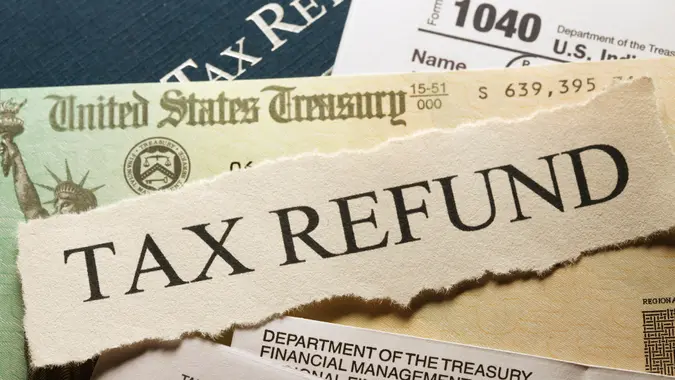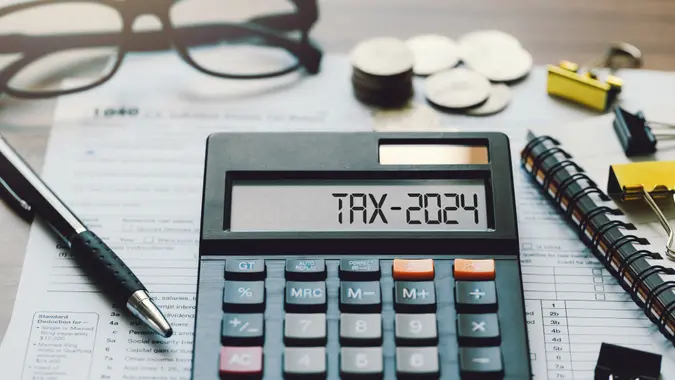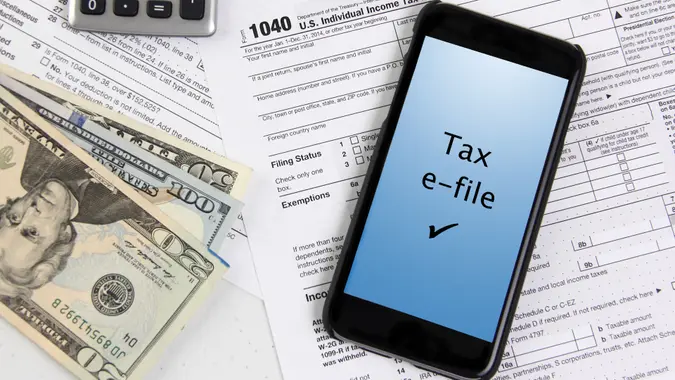Get Ahead on Your Tax Return by Answering These 15 IRS Questions

Commitment to Our Readers
GOBankingRates' editorial team is committed to bringing you unbiased reviews and information. We use data-driven methodologies to evaluate financial products and services - our reviews and ratings are not influenced by advertisers. You can read more about our editorial guidelines and our products and services review methodology.

20 Years
Helping You Live Richer

Reviewed
by Experts

Trusted by
Millions of Readers
Established in 1862 when an income tax was enacted to pay for the Civil War, the Internal Revenue Service is responsible for enforcing the nation’s tax laws and collecting tax revenue. Knowing how the IRS works can make it easier for you to file and pay your taxes each year. Although it’s impossible to cover everything related to the IRS and its tax lawsin one article, you might want to keep this list handy in case you need it when you file your tax return this year.
See: The Major Tax Changes for 2021 You Need To Know About
Helpful IRS Tax Questions and Answers
From general contact information to specific IRS regulations, this list of questions and answers delivers. Here are 15 things every taxpayer should know about the IRS:
How Can I Contact the IRS?
You can call the IRS phone number at 800-829-1040 for questions about individual income tax returns. In case of a hearing impairment, call this IRS number at 800-829-4933. Be aware that the IRS takes protecting your identity very seriously and expects you to verify your Social Security or individual taxpayer identification number, date of birth, filing status, information from your prior year’s return and a copy of the return you’re calling about to verify you are who you say you are.
Learn: How To Avoid Paying Taxes Legally — and the 11 Craziest Ways People Have Done It
How Does the IRS Contact Taxpayers?
The IRS begins most conversations with taxpayers through letters delivered by the United States Postal Service via regular mail and will follow up with several additional notices via mail. The IRS will not send emails or call you demanding that you pay money by a specific method, such as a gift card, debit card or wire transfer. In fact, the IRS will never ask for payment information over the phone at all, so be alert for this kind of scam that is are intended tocompromise your identity.
You also have the right to appeal your tax debt, so if you receive a call threatening that you will be arrested, deported or have your driver’s license revoked if you don’t pay immediately,it’s a tax scam.
How Do I Change my Address With the IRS?
In case you need to change your address, the easiest way to inform the IRS is to use your new address when you file your next tax return. To update your address sooner, you have several options:
- Complete Form 8822, listing your identifying information and your new address.
- Mail a signed written statement including your full name, old address, new address, and Social Security number to the address where you filed your last tax return.
- Call or visit the IRS and provide your name, date of birth, address and Social Security number.
In case you’ve filed a joint return and still live with your spouse, you should both sign the form or statement. In the event that you’re separated, you should each file a separate statement with your respective new addresses.
Do I Have To File a Tax Return?
Generally, whether you must file an income tax return depends on your gross income, filing status and age. Usually, if your gross income is lower than your standard deduction plus your personal exemption, you aren’t legally required to file a return. Dependents have a lower threshold because they cannot claim their own personal exemption.
Similarly, if you are self-employed, you must file if your net self-employment earnings exceed $400 or your church employee income exceeds $108.20. Even if you don’t owe taxes, you might want to file to claim a refund.
Do I Qualify For Free Tax Assistance?
The IRS runs the Volunteer Income Tax Assistance program to provide free tax help to people who make $54,000 or less, people with disabilities and people who speak little or no English. The IRS certifies the volunteers to help qualifying taxpayers to help answer tax law questions, provide tax instructions and shares tax information,such as requirements for various tax credits. Taxpayers over 60 years old can also use the Tax Counseling for the Elderly program to help with senior-specific information, like Social Security income and retirement planning tax topics. You can call 800-906-9887 to find the closest VITE or TCE site.
Check Out: 9 Best Ways To Get Free Tax Help
What Are the Tax Filing Requirements?
You can file your taxes online or by mailing in a paper return. Both you and your spouse must sign a paper tax return, but for electronic returns, you use your IRS PIN to sign.
On paper returns, you can sign for your spouse in the case of a prohibitive medical condition. Here’s how: Sign your spouse’s name followed by your signature, followed by “husband” or “wife” to indicate your role. You must also attach a statement to the return explaining the situation.
In any other situation, you can only sign if you have a valid power of attorney. The address you mail your paper return to varies for each state. Visit theIRS websiteto find out the address for your state.
Do I Have To Make Estimated Tax Payments?
Most taxpayers don’t have to make estimated tax payments because they have income tax withheld from their paychecks. When you have income that isn’t subject to withholding, however, such as capital gains or dividends, self-employment income or alimony, you might need to make estimated tax payments during the year. You won’t be responsible for any underpayment penalties as long as you owe less than $1,000 in taxes with your return, or you have paid 90 percent of your current tax year’s tax liability or 100 percent of your prior tax year’s liability in withholding and estimated payments.
Find Out: How To Calculate Estimated Taxes
How Do I Get a Copy of Tax Returns for Prior Years?
For copies of your tax returns from prior years, request them from the IRS by filingForm 4506and paying a $50 fee for each return requested. But you might not need to. Usually, a tax return transcript will have all of the information you need, and it’s free to request one via the IRS Get Transcript website. After verifying your identity, you can view and print your transcript immediately.
Where Is My Tax Refund?
When you are entitled to a tax refund, you can choose from several options to receive your money, such as via direct deposit or paper check. You can also use the money to purchase savings bonds or have it directly deposited into a traditional IRA, Roth IRA or SEP-IRA.
Consider e-filing your tax return to get it more quickly. When you e-file, you typically get your refund within three weeks of the date the IRS received the return, and potentially even faster if you opt for direct deposit. When filing a paper return, it can take between six and eight weeks to process your return. You can use the“Where’s My Refund?” app to check your status.
How Many People Get Audited Each Year?
In 2016, the IRS audited 1.2 million tax returns. Although that might sound like a big number, it’s just 0.6 percent — six returns per 1,000 — of all tax returns filed, so your chances of being audited are quite small.
The IRS uses computer screening as one way to select returns to be audited based on amounts you report being significantly different from the normal ranges on similar returns. The IRS also uses random screening to select returns at random. So, just because your return is selected for an audit doesn’t mean you’ve done anything wrong.
What Do I Do If the IRS Won’t Respond to Me?
The Taxpayer Advocate Service is an independent group within the IRS that serves taxpayers. For trouble dealing with the IRS, you can contact the Taxpayer Advocate Service to help protect your rights, such as if your problem is caused by financial difficulties, you’re facing the threat of an immediate adverse action or you’ve tried to contact the IRS and the IRS had not responded. Taxpayer advocates are in every state, or you can call the Taxpayer Advocate Service at 877-777-4778.
When Are Federal Income Tax Returns Due?
Individual income tax returns are due on April 15 of the following year, unless April 15 falls on a weekend or legal holiday. Typically, legal holidays refer only to holidays observed in Washington, D.C. For example, if April 15 falls on a Saturday, your return is due on the following Monday, unless that day is also a legal holiday in Washington, D.C.
In 2021, things are a little different. The IRS has announced that the federal income tax deadline for individuals is May 17, 2021 for the 2020 tax year. State deadlines have not changed, however, so make sure to confirm your state’s due date before you file.
Find Out: Tax Year Dates You Need To Know
What Tax Form Should I Use?
The IRS offers three different income tax return forms for individuals:
Form 1040EZ is the shortest, but you can’t claim any dependents, must file as either single or married filing jointly, can’t claim any adjustments to income or itemize your deductions and can only claim the earned income tax credit.
Form 1040A allows you claim a few additional deductions and credits, but your income must still be under $100,000 and you still can’t itemize. Form 1040 is the longest and allows you claim the most deductions and credits and itemize.
Can I Ask For an Extension To File My Tax Return?
All taxpayers are automatically entitled to a six-month extension of time to file their tax returns, regardless of the reason. You qualify for the extension by making an estimated tax payment for the amount you expect to owe and filingForm 4868electronically via the IRS e-file system or by mailing paper Form 4868.
Be aware that this extension only applies to your time to file a return, not the amount of time you have to pay your taxes. When you owe money, make a payment that will cover any debt you expect to owe before the normal tax deadline to prevent interest and penalties from accruing.
What Happens If I Don’t Pay My Taxes?
Interest and penalties will accrue on your tax bill until you pay. The IRS will mail you a notice stating the amount you owe, including any accrued interest and penalties. When you don’t pay, the IRS can place a lien on your property, meaning if you sell it, the IRS gets the proceeds until your debt is paid off. Plus, having a tax lien on your credit report will hurt your credit score.
Up Next: What to Do When You Can’t Pay Your Tax Bill?
More From GOBankingRates
- These Are the Best Banks of 2021 – Did Yours Make the Cut?
- 36 Ways To Save For Your Emergency Fund and Any Unexpected Situations
- Top 100 Banks Leading the U.S. in 2021
- 35 Ways To Slash Your Car Costs
Last updated: Mar. 18, 2021
 Written by
Written by  Edited by
Edited by 

























